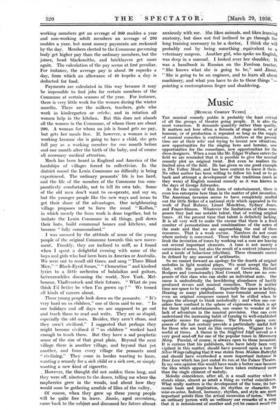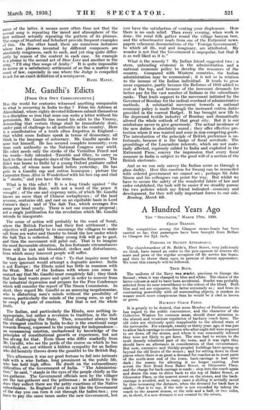Music
[MvsicA.. Commnv Turr*s] THE musical comedy public is probably the least critical of all the groups of theatre going people. It is also the most voracious. It demands quantity rather than quality. It matters not how often a formula of stage action, or of humour, or of production is repeated so long as the supply of musical comedies is continuous. Authors at the present time are at their wits' end trying to invent new Situations, new opportunities for the singing hero and heroine, new opportunities for the comedians, new opportunities for the dress designers. When a man like Mr. Edgar Wallace enters the field we are reminded that it is possible to give the musical comedy plot an original twist. But even he realizes the limited area of the field. He has given us one good example in The Yellow Mask, and has been content to leave it there. No other author has been willing to follow his lead or to go back and attempt a development of the traditions (such as they were) of English musical comedy as it was known in the days of George Edwardes.
As for the music of this form of entertainment, there is even less enterprise here than in the matter of plot invention. The American invasion seems to have completely snuffed out the little flicker of a national style which appeared in the work of Paul Rubens, Lionel Monckton, Sydney Jones, and Fraser-Simson. WhateVer the limitations of these com- posers they had one notable talent, that of writing original tunes. At the present time that talent is definitely
It is all very well to make the excuse that there is a fixed number of permutations and combinations .of the notes of the scale and that we are approaching the end of these resources. That is a weak excuse. Numbers do not count Where melody is concerned. Those who think that they can limit the invention of tunes by working out a sum are leaving out several important elements. A tune is not merely a' succession of notes, but also the result of a context (character) and a mode of behaviour (rhythm). These elements cannot be defined by any amount of arithmetic. So we cannot forward an apology for the dearth of original melodies in light musical plays. We must accept the fact that, with the possible exceptions of Gershwin, Richard Rodgers and (occasionally) Noel Coward, there are no -com- posers of this class who can strike an individual note. One cause is undoubtedly the bewildering abundance of hastily produced revues and musical comedies. There is neither time nor space to be original. Especially the space is lacking. Hearing so many platitudinous tune-formulie around him, even an original composer cannot but be stifled when he begins the attempt to think melodically ; and when one cop- siders how confined is the sphere of expression which is apt for these light entertainments, one ceases to wonder at the lack of adventure in the musical provision. One can even understand' the increasing kabit of tunulig to well-established operatic " scores for suggestions. The French opera com- posers of the last century provide a particularly useful field for those who are bent on this occupation. Wagner too is useful at times. A theme in the Siegfried Idyll served as a very good send-off for one of the popular tunes in Mercenary Mary. Puccini, of course, is always open to these invasions. It is curious that his publishers, who have lately been very. vigilant in this matter, should have pounced upon a tune in Silver Wings (alleging that it was stolen from Madam Butterfly) and should have overlooked a more important instance in Dear Love which has just ended its run at the Palace Theatre. In my own opinion this would have made'a better case because the idea which appears to have been taken embraced more than the single element of melody. Melodic coincidence, after all, is a small matter when it stands alone, almost as small a thing as verbal coincidence. What really matters is the development of the tune, its har- monic basis and iMplication, its rhythm or character, its raise-en-scene. Indeed, harmony; rhythm, and style are.more important pointS than the actual succession of notes. When aki ordinary person with an ordinary ear remarks of a song that it is reminiscent of another and yet he cannot recall the name of the latter, it means more often than not that the second song is repeating the inEod and atmosphere of the first without actually repeating the pattern of its phrases. The songs of Stanford and Schubert provide frequent examples of this. On the other hand; there are numerous instances where two phrases- invented by different composers are absolutely congruous, each to each, and yet ring quite differ- ently by reason of the context in each case. An example is a phrase in the second act of Dear Love and another in the song, " sing thee songs of Araby." It is quite impossible to arrive at a satisfactory settlement of so fine a matter in a court of law, especially in one where the Judge is compelled to ask for an exact definition of a semiquaver.
BASIL MAINE.















































 Previous page
Previous page